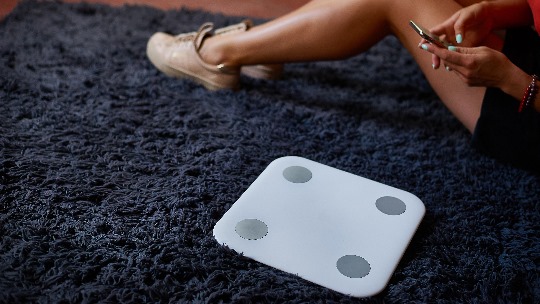Think body fat percentage (BFP) is just for athletes and bodybuilders? Personal trainers have been using it to measure fitness for years, but you rarely get tested at the doctor’s office. So, is body fat a reliable indicator of how healthy you are?
What is BFP?
BFP measures body composition, namely the ratio of body fat to non-fat mass. Body fat is the percentage of fat in muscles, under the skin, and around organs. Non-fat mass includes bones, organs, and substances such as water and connective tissue. BFP is most accurately measured using a body composition scale but it can also be measured manually with calipers.
“Body fat is vital to daily functions,“ says Tim Rabetoy, certified personal trainer and medical exercise specialist. “It cushions joints, protects organs, helps regulate body temperature, and stores vitamins. By design, women’s bodies require a higher percentage of body fat to be healthy.”

Healthy BFP Ranges
Women
- 20–39 years: 21–32%
- 40–59 years: 23–33%
- 60+ years: 24–36%
Men
- 20–39 years: 8–19%
- 40–59 years: 11–21%
- 60+ years: 13–24%
What’s good about BFP?
BFP isn’t a measurement that’s typically taken at your annual physical. But Andrew Perry, M.D., F.A.A.P., F.A.C.E.P., says it can be a useful way to understand the causes of weight issues in undernourished patients and patients with a high body mass index (BMI) but low body fat because much of their weight is stored as muscle.
Rabetoy says that one of the most fascinating things about body fat percentage is how it affects people mentally and emotionally. “Confidence and self-esteem will generally be much better among people with a healthy level of body fat,” he says. “When people look better and feel better, they’re much more likely to be truly happy. Mind and body working together.”

What’s not?
Like any health metric, lower isn’t always better. When body fat percentage gets below the healthy range, even for athletes, it’s cause for concern. From a medical perspective, Dr. Perry says BFP is a useful measurement, but it’s mostly used in research studies and isn’t vital to measure on a regular basis.
The verdict
BFP is a good measurement of physical health, diet, and exercise, but it should be considered in conjunction with other health measurements like weight and BMI. “Maintaining a healthy body fat percentage will help your body function optimally, reduce the risk of metabolic or circulatory disease, improve physical performance, and improve self-esteem and confidence,“ says Rabetoy.




